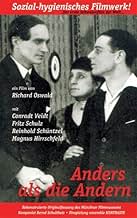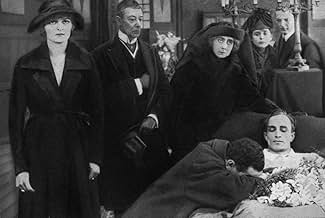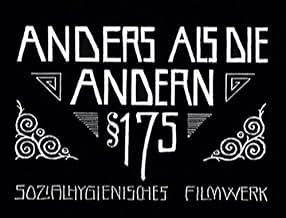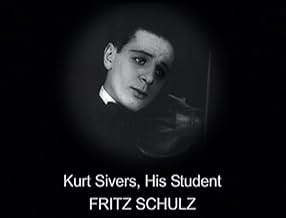VALUTAZIONE IMDb
7,0/10
1626
LA TUA VALUTAZIONE
Aggiungi una trama nella tua linguaTwo male musicians fall in love, but blackmail and scandal makes the affair take a tragic turn.Two male musicians fall in love, but blackmail and scandal makes the affair take a tragic turn.Two male musicians fall in love, but blackmail and scandal makes the affair take a tragic turn.
- Regia
- Sceneggiatura
- Star
Recensioni in evidenza
Interesting early film dealing with homosexuality and the laws in Germany at the time making it a crime punishable by a prison sentence. About a famous violin virtuoso, Paul (played by Conrad Veidt), who after a concert one evening is approached by a handsome young man named Kurt who idolizes and has a youthful crush on the older man. Kurt dreams of taking lessons from his idol, so visits the kimono-dressed man in his apartments where he is soon being given private violin lessons. The two men quickly become closer and closer, playing duets together on violin and piano, and taking strolls in the park arm and arm, but unfortunately a blackmailer sees them in the park - and seizes upon an opportunity to make himself some quick "hush money". Interestingly, the blackmailer himself hangs out in a nightclub full of women dressed as men, and pairs of men dancing together, which made me wonder - is he out to find himself another victim for blackmail here or is he himself?
This film is a reconstruction containing fragments, strung together in a well-done manner with intertitles and still photos describing and portraying the missing scenes. The print for the scenes that are intact look quite nice here, the music is appropriate and pleasing. Parts of the film almost come across as instructional, including a lecture given by a sexologist featuring a slide show of males and females mostly in various states of cross-dress. Conrad Veidt gives a very well-done, touching performance here, really giving off a keen sense of the strong relationship and love felt between Paul and Kurt. Well worth seeing.
This film is a reconstruction containing fragments, strung together in a well-done manner with intertitles and still photos describing and portraying the missing scenes. The print for the scenes that are intact look quite nice here, the music is appropriate and pleasing. Parts of the film almost come across as instructional, including a lecture given by a sexologist featuring a slide show of males and females mostly in various states of cross-dress. Conrad Veidt gives a very well-done, touching performance here, really giving off a keen sense of the strong relationship and love felt between Paul and Kurt. Well worth seeing.
It's a shame that about half of this film is lost, deliberately destroyed by the Nazis. What is odd is that probably the tamest portions of the film are missing - the parts with Paul Körner (Conrad Veidt) and his family, and the parts in which Paul interacts with Else, the girl who loves him. The parts that are missing though are masterfully replaced by still shots and enough inter-titles that you get a pretty good idea of how Paul gets along with his family.
The film was made after World War I during a brief time of relative tolerance for homosexuality in Germany, and rather than try to be titillating, the film tries to teach of the problems with the German law that made it a crime to be homosexual. Paul Körner is a famous violin virtuoso who harbors a terrible secret - he's gay and constantly in fear of being discovered and prosecuted under the law. As a result, you realize that Paul is a rather sad and lonely man despite his professional success, unable to openly express himself and look for a life-partner out in the open. Things change when Paul takes on a pupil, Kurt Sivers, a young man who idolizes Paul. Paul seems to really fall for Kurt, but you can tell that Kurt is still somewhat unsure of what to make of his own feelings at this point. Unfortunately, Kurt's sister Else loves Paul too, not knowing that Paul is unable to return the sentiment.
Paul is also being hounded by a blackmailer who first met him in a gay dance hall. When Paul mistook the blackmailer's advances as romantic, he took him back to his home and there the man spurned Paul and demanded money. You get the impression he's been hounding him ever since that time. What is odd is that the gay dance hall where he and Paul first met almost seems to be the blackmailer's second home, so I have to wonder why the blackmailer isn't afraid of being blackmailed himself.
There's a well done set of scenes with Paul looking back on his life - his adolescence at boarding school specifically - and the trouble he had there on account of his orientation. There's even a scene with a sexologist lecturing on homosexuality - oddly enough, this is how Paul explains to Else the truth of who he is and that his rejection of her is not personal.
Highly recommended as a good reconstruction of a lost silent film.
The film was made after World War I during a brief time of relative tolerance for homosexuality in Germany, and rather than try to be titillating, the film tries to teach of the problems with the German law that made it a crime to be homosexual. Paul Körner is a famous violin virtuoso who harbors a terrible secret - he's gay and constantly in fear of being discovered and prosecuted under the law. As a result, you realize that Paul is a rather sad and lonely man despite his professional success, unable to openly express himself and look for a life-partner out in the open. Things change when Paul takes on a pupil, Kurt Sivers, a young man who idolizes Paul. Paul seems to really fall for Kurt, but you can tell that Kurt is still somewhat unsure of what to make of his own feelings at this point. Unfortunately, Kurt's sister Else loves Paul too, not knowing that Paul is unable to return the sentiment.
Paul is also being hounded by a blackmailer who first met him in a gay dance hall. When Paul mistook the blackmailer's advances as romantic, he took him back to his home and there the man spurned Paul and demanded money. You get the impression he's been hounding him ever since that time. What is odd is that the gay dance hall where he and Paul first met almost seems to be the blackmailer's second home, so I have to wonder why the blackmailer isn't afraid of being blackmailed himself.
There's a well done set of scenes with Paul looking back on his life - his adolescence at boarding school specifically - and the trouble he had there on account of his orientation. There's even a scene with a sexologist lecturing on homosexuality - oddly enough, this is how Paul explains to Else the truth of who he is and that his rejection of her is not personal.
Highly recommended as a good reconstruction of a lost silent film.
Two male musicians fall in love, but blackmail and scandal makes the affair take a tragic turn.
Director Richard Oswald was bold in making this film and pushing the message that homosexuality was not a crime but a failure of society to be accepting. Especially at the time when homosexuality was blatantly illegal in Germany. Not surprisingly, the film was soon banned and almost completely destroyed.
Conrad Veidt was also bold for starring in it, even if he had not yet been made into a star for "Cabinet of Dr. Caligari" the following year. This was at least Veidt's second time working with Oswald, having just finished up "Uncanny Stories".
The plot is interesting in making the presentation that homosexuality is normal (definitely a minority view at the time) and the real crime was extortion from those who would blackmail closeted men. Although neither Oswald nor Veidt were gay, they clearly had sympathy for their brethren (Veidt was later better known for standing up for the Jewish community).
Director Richard Oswald was bold in making this film and pushing the message that homosexuality was not a crime but a failure of society to be accepting. Especially at the time when homosexuality was blatantly illegal in Germany. Not surprisingly, the film was soon banned and almost completely destroyed.
Conrad Veidt was also bold for starring in it, even if he had not yet been made into a star for "Cabinet of Dr. Caligari" the following year. This was at least Veidt's second time working with Oswald, having just finished up "Uncanny Stories".
The plot is interesting in making the presentation that homosexuality is normal (definitely a minority view at the time) and the real crime was extortion from those who would blackmail closeted men. Although neither Oswald nor Veidt were gay, they clearly had sympathy for their brethren (Veidt was later better known for standing up for the Jewish community).
It's a wonder any of this film exists; if not for the wear of age (it's said that most films of this era are lost), one would think censorship and the Nazis would have annihilated it. Yet, much of the footage remains. The Kino release of the reconstruction fills in the rest of the story with explanatory intertitles and still photographs, nearing the film's original runtime. That's the first wonder.
The second is its message of tolerance and understanding of homosexuals. Message films, social realist films, or "enlightenment films" were not too common in the silent era, probably because the lack of sound takes away from the capacity to lecture. Lois Weber is an exception that I'm familiar with; she made a career out of selling morals to audiences. "Different from the Others" includes the tact of a self-referential scene, which Weber broadened to more interesting depths in her best work. This is a film pleading for the equality of homosexuals, and it features a lecture within the lecture doing the same: the "sexoligist" Magnus Hirschfeld giving a slideshow presentation, which is attended by Else. I think it makes the film more honest, and, at the same time, it's a way for the filmmakers to be as blunt as possible.
It's difficult to appreciate the film aesthetically, anymore. The gay nightclub scenes are frank, but the film seems to shy away from too much intimacy between homosexuals. "Philadelphia" (1993) has been criticized for it's lack of a kiss, too, so I suppose it's asking too much of a film from 1919. The camera-work appears rather static, as well. On the other hand, Conrad Veidt was an admirable man and quite an actor. This is as much bravery from a prominent actor as you'll ever see. And, he was outspoken against the Nazis, as opposed to Emil Jannings, probably the other major male star of German silent film. Although Veidt's performance is much in the style of the time, he shows the right balance of effeminacy without being stereotypical.
Other than Veidt, the film isn't of much entertainment or artistic value. The film's message, however, is very important, even today; as the reconstruction introduction says, Germany, while a generally liberal government and populace today, Paragraph 175 wasn't repealed until 1994. And, there's the marriage debate in the US and elsewhere. "Different from the Others" is powerful in that way.
The second is its message of tolerance and understanding of homosexuals. Message films, social realist films, or "enlightenment films" were not too common in the silent era, probably because the lack of sound takes away from the capacity to lecture. Lois Weber is an exception that I'm familiar with; she made a career out of selling morals to audiences. "Different from the Others" includes the tact of a self-referential scene, which Weber broadened to more interesting depths in her best work. This is a film pleading for the equality of homosexuals, and it features a lecture within the lecture doing the same: the "sexoligist" Magnus Hirschfeld giving a slideshow presentation, which is attended by Else. I think it makes the film more honest, and, at the same time, it's a way for the filmmakers to be as blunt as possible.
It's difficult to appreciate the film aesthetically, anymore. The gay nightclub scenes are frank, but the film seems to shy away from too much intimacy between homosexuals. "Philadelphia" (1993) has been criticized for it's lack of a kiss, too, so I suppose it's asking too much of a film from 1919. The camera-work appears rather static, as well. On the other hand, Conrad Veidt was an admirable man and quite an actor. This is as much bravery from a prominent actor as you'll ever see. And, he was outspoken against the Nazis, as opposed to Emil Jannings, probably the other major male star of German silent film. Although Veidt's performance is much in the style of the time, he shows the right balance of effeminacy without being stereotypical.
Other than Veidt, the film isn't of much entertainment or artistic value. The film's message, however, is very important, even today; as the reconstruction introduction says, Germany, while a generally liberal government and populace today, Paragraph 175 wasn't repealed until 1994. And, there's the marriage debate in the US and elsewhere. "Different from the Others" is powerful in that way.
Conrad Veidt plays a famous musician who is blackmailed for being gay. Eventually he stands trial and is convicted. At the end the Film pleads for the abolition of § 175(The Paragraph which punishes homosexuality).
The making of such a film was only possible because after WWI there were no Censorship laws in Germany. After a wave of sexually explicit films they were reinstalled and 'Anders als die andern' was banned for the public in Aug.1920. Not until 1957 would homosexuality be a main topic in a film again (Anders als Du und Ich).
Sadly this historic film is lost. But Portions of it were incorporated into another film (Gesetze der Liebe/Laws of Love,1927) and survived. These have been restored to a length of 41 min..
The making of such a film was only possible because after WWI there were no Censorship laws in Germany. After a wave of sexually explicit films they were reinstalled and 'Anders als die andern' was banned for the public in Aug.1920. Not until 1957 would homosexuality be a main topic in a film again (Anders als Du und Ich).
Sadly this historic film is lost. But Portions of it were incorporated into another film (Gesetze der Liebe/Laws of Love,1927) and survived. These have been restored to a length of 41 min..
Lo sapevi?
- QuizMagnus Hirschfeld, a prominent sexologist, co-wrote the screenplay and made a cameo appearance as The Doctor, with whom Paul Korner consults. A scene resembling that of the modern-day LGBT scene existed in Weimar Germany, albeit underground, and the scene at the gay bar featured actual LGBT individuals. The screenwriter and author Anita Loos said of this period, in 1923: "Any Berlin lady of the night might turn out to be a man: the prettiest girl on the street was Conrad Veidt, who later became an international film star." (It was Hirschfeld who coined the term 'transvestism.')
- Versioni alternativeThere is an Italian edition of this film on DVD, distributed by DNA srl, "DIVERSI DAGLI ALTRI: Alle Origini Del Cinema Gay - Special Edition" (4 Films on a single DVD: Mikaël, 1924 + Fireworks, 1947 + Un chant d'amour, 1950 + Anders als die Andern, 1919), re-edited with the contribution of film historian Riccardo Cusin. This version is also available for streaming on some platforms.
- ConnessioniEdited into Gesetze der Liebe (1927)
I più visti
Accedi per valutare e creare un elenco di titoli salvati per ottenere consigli personalizzati
- How long is Different from the Others?Powered by Alexa
Dettagli
- Data di uscita
- Paese di origine
- Lingue
- Celebre anche come
- Different from the Others
- Luoghi delle riprese
- Berlino, Germania(unknown scenes)
- Aziende produttrici
- Vedi altri crediti dell’azienda su IMDbPro
- Tempo di esecuzione50 minuti
- Colore
- Mix di suoni
- Proporzioni
- 1.33 : 1
Contribuisci a questa pagina
Suggerisci una modifica o aggiungi i contenuti mancanti

Divario superiore
By what name was Anders als die Andern (1919) officially released in India in English?
Rispondi


























